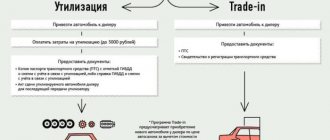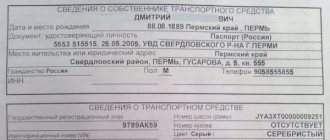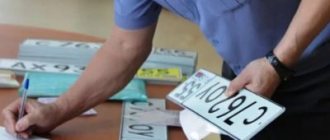In what cases is it possible to terminate the registration of a crashed, damaged or burned-out vehicle that is not running?
A car may be deregistered under certain circumstances:
- After an accident, a car cannot be restored;
- Car theft;
- The registration period has ended;
- If, after selling the car, the buyer does not register it within a certain period, the seller has the opportunity to independently terminate the registration;
- The car is permanently exported to another state;
- Dismantling for parts and complete disposal of the vehicle;
- The legal entity that owns the transport has ceased its activities;
- Death of the owner;
- Returning the car to the dealership, for example, after identifying deficiencies.
Quite often you have to deal with a situation where, after selling a car, the new owner does not register it. Naturally, in this situation, the former owner continues to pay taxes. To remove this burden from yourself, you must wait ten days. This is the period given to the buyer to register the car. After ten days, you can contact the traffic police department with a request to stop registration. To do this, you will need to present a contract confirming the sale of this car.
( Video : “How to deregister a car in 2021 Online. Without a trip to the traffic police in 5 minutes”)
How to deregister a car after an accident while not driving
There are situations when, after an accident, a vehicle cannot be restored. Naturally, you need to take care of removing it from the registration register. If you wish to terminate registration due to disposal, you should determine the future fate of the vehicle in advance. There are several options:
- Selling for further disassembly. Often repair services buy such cars to obtain spare parts.
- Complete recycling. This process involves sending the car to a company that specializes in car recycling.
- Partial recycling. In this case, the owner retains individual components and assemblies. After this, unnecessary residues are sent for recycling.
The order of further actions will largely depend on which of these options was chosen.
Registration assistance
To avoid difficulties and errors at various stages of registration procedures, thousands of car enthusiasts turn to us every year. The help of uchet-gibdd24 specialists is multifaceted:
- Preparing an application.
- Collection of documentation.
- Competent consultations.
Dial our number and make an appointment with a specialist. We will help resolve the issue as quickly and legally competently as possible.
Related posts:
- How to evaluate a car license plate number?
- Deregister a car
- Order a beautiful license plate for your car
- How much does it cost to register a car with the traffic police and traffic police upon purchase?
- How to register a motorcycle with the traffic police?
- How to register a car without registration?
- How to pass MOT according to the new rules?
How to deregister a car for recycling in 2021?
Of course, many drivers may have the idea that some components and assemblies can be removed from the car before complete disposal. However, there are situations, for example, after a severe accident they become unsuitable for further use.
To terminate registration, the owner must appear in person at any traffic police department. Naturally, in this case there is no need to bring a car. You should take with you the documents for the vehicle and license plates that will need to be surrendered. It is worth noting that a vehicle that is being prepared for complete disposal does not always have a registration certificate. It is possible that license plates will also be missing. But this should not be an obstacle to canceling registration.
In general, responsible employees must visually inspect such a vehicle. This will make sure that the car is not running and cannot be restored. To do this, such equipment can be delivered to the department on a tow truck, or a traffic police officer can be called to the parking lot of a non-transportable vehicle. After the inspection, a corresponding report is issued, which confirms that the machine really cannot be used. The act and statement of the owner are grounds for termination of registration. Although you need to know, the inspector can legally refuse to inspect the vehicle. There may be certain reasons for this. To avoid such a problem, the driver is advised to ensure that the license plates are clean in advance. Painted headlights and tinted front windows can also cause failure.
But in reality everything happens much simpler. If the owner deregisters the car and gives up the license plates, naturally, he is not going to drive it. Otherwise, he will have to pay huge fines. Thus, there is no urgent need to inspect a non-transportable vehicle. Practice shows that if the owner has presented all the necessary documents, deregistration can be processed on the same day. In this case, the documents and license plates available for this car are disposed of by responsible employees.
You may also encounter a situation where a car is deregistered, but later an opportunity was found to restore it. If scrapping is cancelled, the vehicle must be registered again. Registering such a car is no different from regular registration.
Deregistration of a car for sale of a car
Quite often, owners of cars that are not suitable for use sell them. The main buyers are repair shops and private car mechanics. Such a sale involves further disassembly of the machine to obtain spare parts. Deregistration in this case occurs in the same way as cancellation of registration for disposal:
- Bring your ID and car documents to any traffic police department;
- Provide an application requesting termination of registration;
- It is advisable to attach an explanatory letter to the application, in which you can describe in detail the reason for such a decision. For example, you can write that the cost of repairs is 80 percent of the price of the car;
- The owner receives a receipt according to which he must pay the state fee;
- After deregistration, the car can be sold for spare parts.
However, such a sale has certain nuances that need to be remembered. For example, an engine sold assembled will cost more if you receive a document from the traffic police confirming that it was removed from a non-restorable car. This document allows the buyer to officially install the engine on the body of another car of the same model.
You also need to be careful with those buyers who do not want to purchase a car for disassembly without documents. Surely such a person is planning to commit some kind of atrocity. There are known cases when a car with a title was sold for dismantling. But the buyer restored it, committed a crime, and abandoned the car. Naturally, in this case the seller becomes the main suspect. If a person is trying to prove that there should be documents on the car, it is better not to contact him at all.
Procedure
If you do not plan to scrap the car, you must perform the following steps:
- the owner must provide the car for inspection;
- or you can call an employee to the place where the car is located if the damage does not allow access for a traffic inspection;
- Traffic police officers inspect the facility and issue a conclusion.
If it is confirmed that the car is really not running, then a Car Defect Report is issued. After this, you will have to contact the traffic police department again to submit an application and other documents for removal.
Dear reader! Didn't receive an answer to your question? Our expert lawyers work for you. It's absolutely free!
- Moscow ext 152
- St. Petersburg ext 152
- All regions ext 132 (Toll free)
Deregistration due to loss
There are many reasons why an owner is unable to operate a vehicle.
The most common is the loss of a car. Of course, a burnt out or rotten car can be considered a loss. But in this case, its remains must still be disposed of. In most cases, loss means theft of a car. In fact, the car simply does not exist, and there is no possibility of returning it. Naturally, the owner must contact law enforcement agencies with a statement. During the period of investigative activities, the owner has the right to contact the traffic police department with a request to temporarily stop the registration. Since a stolen car may be wanted for quite a long time, the registration may be suspended for a long time.
In addition, the owner is allowed to cancel the registration completely. This can be done both after the completion of investigative activities and during their process. You also need to remember, if a car in which the STS and PTS were stolen is stolen, try to suspend the registration as soon as possible. It is possible that this car will take part in some crime.
When deregistering, the owner must submit an application. It is recommended to clarify that it is not possible to present the car for inspection. It would be useful to indicate the circumstances under which the loss occurred.
Documentation
Before going to the traffic police department, you need to make sure that you have all the documents on hand. The list of required documents is influenced by the reason why the owner wants to deregister the car:
- Hijacking. The driver must present his passport, PTS, application, certificate from the authorities that are searching for the stolen car.
- Re-registration. In this case, in addition to your passport, you will need STS, SNILS, INN, a receipt for payment of state duty, and an application. Typically, re-registration is necessary when the driver changes his place of residence and permanent registration.
- Sale. The applicant’s passport, contract confirming the sale of the car, payment of state duty. In this case, both the seller and the buyer can deregister.
- Export from the country. As a rule, deregistration is necessary when the owner of the car permanently takes it to another state. You will need confirmation of payment of the fee, identification card, PTS, STS, and an application requesting termination of registration.
- Disposal. Passport, STS, PTS, license plates, payment of fees, application. The cost of the fee includes an inspection of the car by an inspector and obtaining the appropriate certificate.
There are situations when the owner simply does not have some documentation, for example, when a car with a registration certificate is stolen. Or, in a fire, not only the car was burned, but also the license plates and documents for it. In this case, the application indicates the reason why the owner is unable to provide a particular document.
Features of deregistration of damaged cars
In this section, we will consider the features of removing vehicles. There are several most common cases that car owners have to deal with.
These include car theft, disposal, sale, removal of the car from the country of residence, as well as withdrawal of credit cars under an agreement.
Vehicle theft
In the event of a car theft, the owner must come to the nearest State Traffic Inspectorate office in order to close the vehicle account.
Such actions must be taken to avoid criminal liability that may be imposed on the owner of a motor vehicle if criminal acts were committed on it.
A vehicle account can be created either by the car owner himself or by a third party with a power of attorney.
Removing a vehicle from your country of residence
Sometimes it is necessary to deregister a car for a number of non-standard reasons due to the need to take the car abroad:
- departure for permanent residence in another country;
- travel abroad for an indefinite period.
In addition, you will need to obtain a registration record in the country where you plan to use it further.
Please note that the opportunity to obtain transit numbers is currently only available to legal entities. The owner or his authorized representative can draw up documents to close the registration.
Disposal of damaged vehicles
A car must be deregistered if it cannot be restored due to multiple mechanical damages.
The same applies to car owners who take part in a government program that allows them to dispose of old and salvage cars.
At the same time, both the owner and a third party can deregister a vehicle using a power of attorney issued by a notary.
Selling a vehicle
When selling, vehicle owners often have questions about how to deregister a whole or broken car, and what is needed for this:
- After purchase, the new owner of the car must re-register the vehicle in his name within a ten-day period.
- If re-registration has not been carried out, the former owner of the vehicle should deregister it himself in order to avoid liability for the actions of the new owner.
Many owners of vehicles, in order not to have to worry about registering them later, already at the stage of concluding a purchase and sale transaction take the buyer to the traffic police, where they change the registration of the car together with him.
Closing a car account under a loan agreement
In this case, if the car is the bank’s collateral and the borrower does not pay for it, the car is deregistered in accordance with the terms of the loan agreement. In this case, the bank seizes the vehicle from the debtor, and it ceases to be registered with him. In this case, the car is deregistered by the credit institution or bank.
All of the above methods (with the exception of exporting a vehicle to another country) allow owners to remove a damaged or undamaged vehicle from the traffic police register without a car.
How to correctly write an application for deregistration of a car
In fact, the driver sets out his request to terminate registration in a corresponding statement.
For this, a special form is used, which can be obtained from the traffic police department, or downloaded online. There should be no difficulties in filling out the document. The following information must be entered here:
- The name of the organ and the city where it is located;
- Full name of the applicant;
- A specific request, namely, “I ask to be removed from the register”;
- All available applications are listed, these are PTS, STS and other documents;
- In the “Information about the owner” column, you need to enter detailed information about him. For individuals, passport details must be provided. If this is an organization, its head and legal address are noted;
- Please fill in the vehicle details below;
- The date of completion and signature of the applicant are indicated.
An appendix to the application may be an explanatory note detailing the reason for such a desire. If a proxy acts on behalf of the owner, his details must also be indicated in the appropriate column of the application. When the applicant is the owner, this field is left blank. It is recommended to enter information in printed characters. If the data is unreadable, the traffic police officer may not accept the application. There are also reasons why an inspector will refuse to deregister a car.
These include:
- outstanding fines or unpaid taxes;
- credit encumbrances;
- a crime that was committed with the participation of this car is being investigated;
- administrative arrest.
Documents for vehicle registration
Before registering your car, you need to prepare a complete set of documents. The list for individuals and legal entities is different. An individual submits an application for registration and the following set of documents:
- your passport
- vehicle registration certificate
- sales agreement
- registration certificate (when re-registering a car)
- OSAGO
- check received after paying state duty
Set of documents for legal entities:
- applicant's passport
- power of attorney from the organization, certified by seal
- copies of constituent documentation, certified by seal
- payment order for payment of duties
- extract from the Unified State Register of Legal Entities
- purchase and sale agreement or leasing agreement
- registration certificate
- old registration certificate (upon re-registration)
- check received after payment of fees
Important! The application indicates the owner’s passport details, information about the car (from the technical passport), the name and address of the department, and a list of documents that are submitted along with the application.
The application form is issued at the MREO, and you can also download it on the traffic police website to fill out at home.
Please note that if there are errors or corrections, the application will not be accepted.











